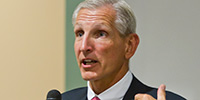
Pitt Public Health alumnus Robert Henkel leads the largest nonprofit health care system in the country. Ascension Health is the health care delivery arm of Ascension, an enterprise comprising 131 hospitals in 23 states and the District of Columbia that bases its reputation for innovation on a spiritual mission to serve all, especially the poor and vulnerable.
Last year, Ascension provided more than $1.8 billion in care for persons living in poverty and community benefit programs. "More than 50 percent of our revenue comes from non-acute care," explains Robert Henkel. Ascension subsidiaries focus on expected areas, such as physician services and medical engineering, but also include global mission support and socially responsible investing. "We’ve worked hard to build related businesses. We’re utilizing our size to better serve the communities we are in."
Henkel has been a key player in Ascension’s diversification. Since 1998, he has guided the system’s efforts across most of the Great Lakes and eastern United States, later adding responsibilities for health care services, information technology, organizational development, operations resources, pension and benefits, risk management, and more. He was named president of Ascension Health in 2012, and since that time has also served as an executive in residence and adjunct professor at Pitt Public Health.
Ascension is the country’s third-largest health delivery system after the Hospital Corporation of America and the Department of Veterans Affairs. That scale means that innovations and improvements can radiate across a vast system. In 2003, Ascension vowed to eliminate 900 preventable hospital deaths a year; eight years later, the system reduced those mortalities by 1,500 a year. Successes included a 94 percent drop in hospital-acquired pressure ulcers, an 89 percent decrease in neonatal mortality, and a 74 percent decline in ventilator-associated pneumonia. Maureen Bisognano, president and CEO of the Institute for Healthcare Improvement, says Ascension’s willingness to share its findings means that "the best practices developed at Ascension Health are now in place in hospitals across the country."
Henkel says, "We don’t want to be the norm. That’s expected. I want to take us to another level and prove as a system we can do these things. There are many other examples where we’re changing expectations, changing national norms."
But outside its hospital doors, Ascension’s willingness to engage with poor, underserved communities is the hallmark of its approach. For more than a decade before the passage of the federal Affordable Care Act, Ascension had committed itself to work for 100 percent access to quality health care. When the Affordable Care Act finally passed, Ascension immediately mobilized to help 40,000 people enroll in insurance plans. And in between, it began to redefine how health care systems engaged in public health.
In Saginaw, Michigan, homeless members of the community who consent to wellness checks receive a unique incentive: they have their laundry done free of charge. Children, teens, and parents in Pasco, Washington, can participate in Bodywork nutrition and activity programs at community centers, learning to prevent obesity. And in Flint, Michigan, where supermarkets had fled the inner city, Ascension helped to create the Healthy Dollar store, offering an oasis of fresh produce in the middle of an urban food desert.
"In Flint and Detroit, a success story grew from a small idea. It was exciting," says Henkel. "We embedded our health workers in the poor neighborhoods. We learned that if the community leaders are the ones building programs, it gets people engaged." Awarding seed grants averaging about $50,000, Ascension worked together with local health departments, churches, and health communities developing business plans to establish sustainable businesses.
Ascension adopted another simple local idea and spun it into a distribution system for free medications for those in need. When a Nashville physician wondered how to put unused pharmaceutical samples to better use, a vision for a free distribution system was born. Inaugurated by Saint Thomas Health, an Ascension member, Dispensary of Hope has evolved into an effective national system that redistributes prescription drugs with the cooperation of pharmaceutical manufacturers. Maryland says the program, which also offers diabetic supplies, has recovered more than $10 billion in potentially unused sample medications over the past seven years.
Henkel sees advocacy as part of Ascension’s mission. Writing recently in Roll Call, the Washington congressional report, he urged law-makers to continue funding for the federal 340B program providing affordable medications for the poor and vulnerable, citing lifesaving stories of Ascension patients. "This is a public health issue, and there are ways to address it," he says.
As states grapple with new structures for Medicaid programs, Ascension has led efforts to connect the unemployed to Indiana’s Pathway to Work system. The project helps Hoosiers apply for health care coverage, then link into job search programs.
Ascension continues to leverage other facets of its operations to support its mission. Ascension Information Services found more than $30 million in cost-savings that have been directed back to its health ministries. The system also continues its work overseas, most recently in the Cayman Islands. Ascension partnered in the first phase of Health City Cayman Islands (HCCI), the construction of a 104-bed tertiary care hospital. HCCI is the idea of an Indian physician, Devi Prasad Shetty, in collaboration with government leaders of the Cayman Islands who envision ultimately not only a hospital, but an educational facility, a biotech park, and an assisted living community. The mission of the joint project with India’s Narayana Health is to provide high-quality health care at low cost and to try to adapt its approaches to care in the United States and even further in the international health care community, while providing new career and economic growth opportunities for residents of the Cayman Islands.
3/04/2015